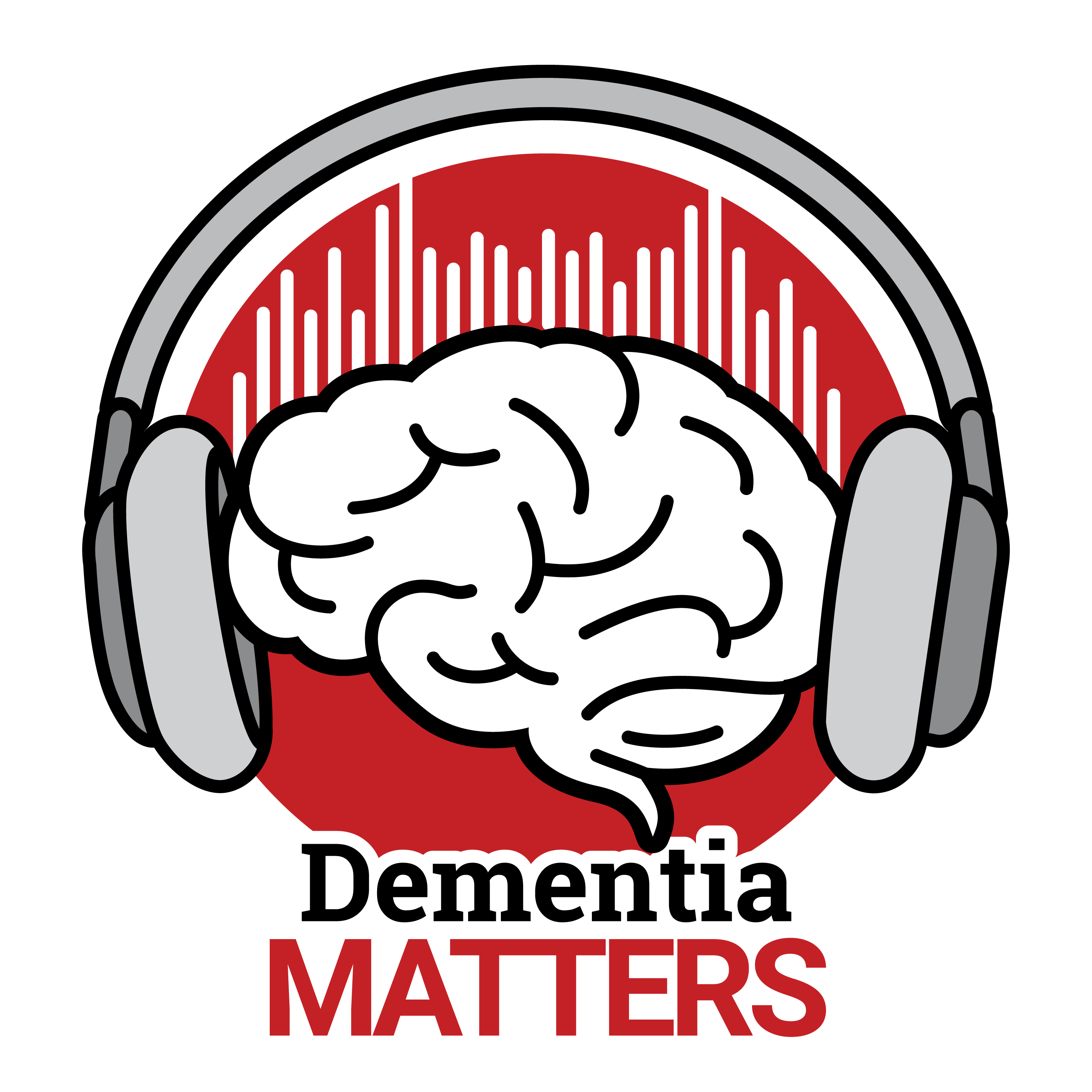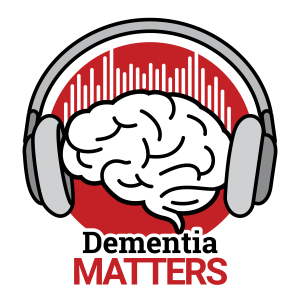
568.3K
Downloads
227
Episodes
Dementia Matters is a podcast about Alzheimer‘s disease and other causes of dementia. Creator and host Dr. Nathaniel Chin interviews leading scientists and caregiving experts to bring listeners the latest in Alzheimer’s disease news, research and caregiver resources. Brought to you by the Wisconsin Alzheimer’s Disease Research Center, find show notes and more resources at adrc.wisc.edu/dementia-matters.
Episodes

Friday Dec 11, 2020
Update on Blood Tests for Predicting Alzheimer’s Disease
Friday Dec 11, 2020
Friday Dec 11, 2020
Recent developments have introduced a blood-based test that could predict Alzheimer’s disease, with more of these tests currently in development. Dr. Sterling Johnson joins the podcast to discuss the significance and accuracy of these blood tests, as well as the impact it will have on Alzheimer’s disease research and care. Guest: Sterling Johnson, PhD, professor of medicine, University of Wisconsin School of Medicine and Public Health
Episode Topics:
- What do biomarkers like brain imaging and cerebrospinal fluid tell us about Alzheimer’s disease? 1:18
- What is the significance of a blood-based biomarker test? 6:08
- What does the blood test tell us about brain health? 8:14
- How accurate are the tests? 9:02
- How are proteins like amyloid or tau found in the bloodstream? 10:28
- What kind of precautionary steps should be taken before these tests can become readily available? 12:23
- When do you think these tests will become available? 15:30
- What do you think is the timeline for the tau protein blood tests? 16:26

Thursday Nov 19, 2020
Vitamin Deficiency and Its Impact on Brain Health
Thursday Nov 19, 2020
Thursday Nov 19, 2020
A study from the University of Wisconsin found 40% of geriatric memory patients were deficient in at least one vitamin linked to brain health. Vitamins tested in this study included B1, B6, B12, and D, all of which play an important role in brain health. Dr. Robert Przybelski joins the podcast to discuss his study, the influence of vitamin deficiency on brain health, and the potential consequences of vitamin deficiency when treating a patient for a memory condition. Guest: Robert Przybelski, MD, associate professor, University of Wisconsin School of Medicine and Public Health
Episode Topics:
-
Why is it important to look for vitamin deficiencies during a memory evaluation? 1:19
-
What were your research findings? 2:03
-
What do you focus on during a memory evaluation? 5:13
-
Is there a difference between normal vitamin levels and optimal levels? 6:40
-
What supplements do you take? 7:42
-
What diet do you think promotes brain health? 8:06
-
Why does your research look at general patients rather than participants? 8:41

Thursday Nov 05, 2020
Benefits of an Early Alzheimer’s Disease Diagnosis
Thursday Nov 05, 2020
Thursday Nov 05, 2020
For individuals concerned with memory loss, the first few steps for screening and diagnosis can be the most intimidating. Dr. Cynthia Carlsson discusses recent progress in Alzheimer’s disease research, health disparities some groups face with the disease, and advice for individuals and caregivers who have concerns about memory loss. Guest: Cynthia Carlsson, MD, MS, professor, University of Wisconsin School of Medicine and Public Health, and director, Wisconsin Alzheimer’s Institute
Episode Topics
- What is the current state of Alzheimer's disease research? 1:41
- Is there more funding toward Alzheimer's disease research and care? 2:59
- How has awareness of Alzheimer’s disease impacted diagnosis? 4:12
- What are the health disparities we see in Alzheimer’s disease? 7:46
- What are the benefits for early screening for Alzheimer’s disease? 11:07
- How does an early diagnosis affect family members or caregivers? 13:36
- Where should individuals concerned with memory loss look for resources? 15:06
- Are there ramifications in research for early diagnosis? 16:08
- What is your advice for individuals concerned with memory loss? 16:50

Thursday Oct 22, 2020
Defining Mild Cognitive Impairment with Dr. Chin
Thursday Oct 22, 2020
Thursday Oct 22, 2020
On October 27th, the NBC drama series This Is Us will return for a fifth season. An integral storyline in the show is the diagnosis of one of the main characters, Rebecca Pearson, with Mild Cognitive impairment (MCI). In this bonus episode, our host Dr. Chin helps define MCI and its potential causes and misconceptions.
Episode Topics:
- What is Mild Cognitive Impairment? 1:37
- Difference between MCI and Dementia: 3:29
- Potential causes for MCI: 4:40

Thursday Oct 08, 2020
Intermittent Fasting and Its Effects on the Brain
Thursday Oct 08, 2020
Thursday Oct 08, 2020
As intermittent fasting has risen in popularity over the last decade, researchers have been exploring its long-term effects on physical health. Dr. Mark Mattson joins to discuss his research on metabolic switching, caloric restrictions, and the cognitive benefits from intermittent fasting. Guest: Mark P. Mattson, PhD, Johns Hopkins University School of Medicine, Department of Neurology
Note: It is best to talk with your healthcare provider before engaging in intermittent fasting.
Episode Topics:
- Defining Intermittent fasting: 1:08
- How long does it take for a metabolic switch? 2:02
- How is this process different from normal dietary recommendations? 3:44
- What did you find in your research on the effects of intermittent fasting on health? 5:36
- Are there cognitive benefits to intermittent fasting? 8:12
- Can intermittent fasting and caloric restrictions improve the brain’s health? 9:49
- How does our modern lifestyles affect our brain and overall health? 16:07
- Is there any evidence that one way of intermittent fasting is better?17:54
- Are there any long-term consequences of intermittent fasting? 20:30
- What do you do in your life to improve your brain health? 22:39

Thursday Sep 17, 2020
Research Update: Aerobic Exercise and Brain Health
Thursday Sep 17, 2020
Thursday Sep 17, 2020
Aerobic exercise is often a recommendation for maintaining cognitive well-being, however its true connections to brain health are still being investigated to learn its effects on Alzheimer’s disease. Wisconsin ADRC exercise physiologist and researcher Max Gaitán joins the podcast to discuss the recent pilot study “Protocol of Aerobic Exercise and Cognitive Health (REACH)” and the study’s future research into the impact of aerobic exercise on brain health. Guest: Max Gaitán, MEd, Research Specialist, University of Wisconsin School of Medicine and Public Health Department of Medicine
Episode topics:
- What were the goals for the REACH study? 1:56
- Was it difficult to recruit participants for the study? 3:18
- What else did you learn from your participants? 4:22
- Did you see any issues with retention in participants? 5:06
- What were the results of the study? 5:42
- What does improved glucose metabolism in the brain mean? 6:57
- Does exercise improve the health of the brain cells? 7:43
- What are the goals of studying metabolomics? 8:55
- What did you define as usual physical activity? 9:47
- How were the exercise targets chosen? 10:38
- Are there studies researching high intensity interval training? 12:39

Thursday Sep 03, 2020
Apps & Alzheimer’s: Supporting Informal Caregiving Through Mobile Technology
Thursday Sep 03, 2020
Thursday Sep 03, 2020
Human factors engineering is the study and design of interactive systems, tools and technologies to best assist individuals in need. We are joined by Nicole Werner, PhD, an engineer working on a mobile technology to serve the lives of informal caregivers. Guest: Nicole Werner, PhD, Harvey D. Spangler Assistant Professor in the Department of Industrial and Systems Engineering, College of Engineering, University of Wisconsin-Madison
Episode topics:
- Explanation of the field of human factors engineering: 1:05
- The challenges of informal caregiving: 2:22
- What are some useful user friendly features for the app? 5:32
- How is the app being tested and improved? 11:38
- How do you know when the app will be ready for launch? 14:15
- Does your lab work with other technology tools for individuals with dementia and their caregivers? 15:55
- As consumers, what are the essential features that we should look for in technology assistance?: 18:10
- Have you encountered any tools you’ve found helpful? 20:07
- What have you learned about caregiving in your work? 22:55

Friday Aug 21, 2020
Sex Differences in Alzheimer’s Disease
Friday Aug 21, 2020
Friday Aug 21, 2020
Almost two-thirds of Americans with Alzheimer’s disease are women. In the Alzheimer’s disease research field, there is an interest in understanding the sex-specific differences in the risk and development of this disease. Dr. Michelle Mielke joins to discuss some of these differences as well as how pregnancy and menopause might affect cognition. Guest: Michelle Mielke, PhD, Mayo Clinic Rochester
Episode Topics:
- What are the sex differences in the development of dementia? 4:09
- What are explanations for these differences? 7:57
- What role does pregnancy and menopause play in the development of cognitive disorders? 10:09
- Could menopausal hormone replacement therapy affect the cognitive development of dementia in individuals? 14:32
- Are there sex differences in the genetic risk of APOE? 21:30
- What do you do in your personal life to maintain brain health? 24:31

Thursday Aug 06, 2020
Thursday Aug 06, 2020
A recent study from researchers at the University of Wisconsin School of Medicine and Public Health found that people who lived in the most disadvantaged neighborhoods were about twice as likely to have Alzheimer’s disease-related brain changes at autopsy than people who lived in the wealthiest neighborhoods. One of the authors joins the podcast to discuss the research findings, the methodology behind the study, and future research directions. Guest: Ryan Powell, PhD, University of Wisconsin School of Medicine and Public Health Department of Medicine
Episode Topics:
- What are social determinants of health? 1:30
- What is the Area Deprivation Index? 3:28
- What did your study investigate? 7:24
- What did you learn from your study of brain autopsy results? 8:49
- How do you think social factors interact with brain changes? 11:10
- Why is access to Alzheimer’s Disease Research Centers important? 13:35
- What is the next step for your research? 16:44
- As a society, how can we slow the development of Alzheimer’s disease? 20:33

Thursday Jul 16, 2020
Exploring the Lessons Learned as a New Caregiver
Thursday Jul 16, 2020
Thursday Jul 16, 2020
After serving as the primary caregiver for his wife for 11 years, Dr. Arthur Kleinman shares the unexpected experiences, difficulties and lessons that he faced. His book, The Soul of Care: The Moral Education of a Husband and a Doctor, chronicles the emotional and physical journey as a caregiver for a loved one with Alzheimer’s disease. Guest: Arthur Kleinman, MD, professor of medical anthropology and cross-cultural psychiatry, Harvard University
Episode Topics:
- Do you believe caregiving and empathy can be taught? 1:25
- Unexpected experiences as a caregiver: 3:34
- How do you communicate to your loved ones you need help with caregiving? 10:22
- Differences between “illness” and “disease”: 20:38
- Why is important for the community to welcome individuals with memory loss? 27:06
